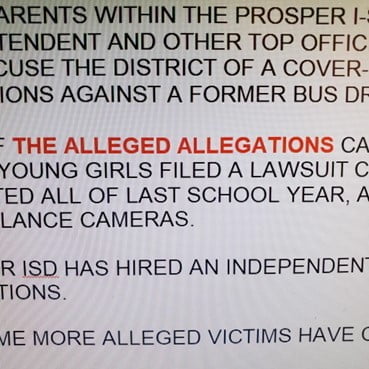The police scanner told of a high-speed chase in progress near me. When I arrived, the runner had been stopped and arrested. As a young news reporter, I managed to get a few words with one of the officers involved and rolled tape. He told me what had happened and finished by saying, “We apprehended the suspect as he exited the vehicle.”
I grinned slightly.
“What’s wrong?”
Embarrassed, I said, “Oh, nothing but I wonder if you can give me that last part again, only this time say – ‘We caught the guy when he got out of the car’?”
The officer laughed and said sure, and he did.
I know that was unprofessional of me. I was a young knucklehead news pup. Luckily I had a cop with a sense of humor and I’m sure he told the story around the precinct.
As broadcast news professionals words are our tools. We shouldn’t tell our interview subjects how to speak, but learning to choose our own words carefully distinguishes our ability to accurately, concisely, and naturally tell a story. We need to speak simply. When we lapse into newspeak and cop talk we sound stiff, dull, and condescending. There’s no faster way to disconnect from our audience.
The U.S. Department of Justice provides a Media Relations Guide for law enforcement personnel who interact with reporters:
“Avoid legal terms, acronyms, and law enforcement lingo that the public may not understand. And whether your words are written or spoken, think of how they will sound when quoted. Consider providing your own quotable ‘sound bites.’”
That’s a pretty decent guide for broadcast reporters as well as federal agents and media relations officers. We all want to sound smart but going too far will slide us right into the BS zone. Listeners will get bored and sense they’re being gamed.
Police talk about suspects, subjects, persons of interest, and victims. They talk that way to avoid bias in legal proceedings. As reporters, we aren’t constrained from talking naturally as long as we don’t slander people or convict them by implication. We use cop talk as a crutch. Rather than simply saying a police officer shot a man we call it “an officer-involved shooting.” That’s what police call it but it doesn’t pass the human sniff test. To most people, it sounds like you’re trying to avoid the obvious: a cop shot a guy.
Freda Ross, longtime reporter and News Director at WBAP and KLIF, Dallas, explains her approach: “When coaching reporters, I tell them to listen to what the official is saying and then write it in everyday language that the average person can understand…The job of a good reporter is to comprehend what the newsmaker is saying and break it down for the listener.”
It should be as simple as that but something human happens to us when we sit down behind a microphone and keyboard: that natural tendency to sound smart and blow smoke; and more importantly, to avoid unforeseen legal problems. That’s why we soak ourselves in the words, “alleged” and “suspect”.
“Alleged” has been so overused and misused that it has become irrelevant. Choose a dictionary, they all say the same thing: “Alleged means ‘asserted to be true as described’ or ‘accused but not yet tried.’” – Black’s Law Dictionary 82 (8th Ed.2004)
Period.
If a crime occurred it is a fact, not an allegation. Yet, to shield ourselves from accusations of bias we write and talk about “alleged” murders, kidnappings, robberies, etc.
Excuse me, the guy was found with his hands tied and a bullet in his head. That’s not an allegation, it’s a murder. As a news person, you’re allowed to say that.
Here’s a piece of news copy I found in my morning rundown not long ago. Red highlighting is mine. Notice, the words “alleged victims” also appear at the bottom.

When I was working in Chicago at FM-101, our program director — former L.A. reporter Andy Friedman — started something I thought was brilliant. He walked into the newsroom one day and stuck some words on the wall; it was a literal and symbolic wall of words to be avoided.
“There are so many words you hear in crime stories, but not in conversations between ordinary people,” Andy explains. “Our idea was to have everyone contribute to a list of ‘police-ese’ words that we would not use on the air. These included things like, ‘traveled at a high rate of speed,’ ‘offenders were apprehended’ and ‘the motorist exited the vehicle.’ We made this a fun group exercise, but the message was serious. We wanted to relate to our audience by speaking like them.”
That wall was instructive and served as a constant reminder to all of us. As Andy hoped, everyone did contribute. It became a rallying point for writers, reporters, and hosts, where every newly posted word or phrase was proudly proclaimed, discussed, and cheered. That wall of banned words bound us to each other as news professionals and to the two-word cliche that kept us focused: Words matter.
Over the years I’ve started and abandoned many lists of words and phrases to be avoided, words I heard or read where I was working at the time. Though I am something of an obsessive word nerd, there didn’t seem to be a point for the list except as a reminder to myself and to vent my momentary professional frustration. Fortunately for us all, I have a former colleague and very close friend who may be as anal about it as I am.
My camping buddy, Bret Burkhart, holds more major news awards than anyone I know, including multiple Murrows, from his years of work at KGO in San Francisco. He’s now co-hosting afternoon drive at KCBS.
I asked Bret for his list and here’s what he gave me. It’s straight off the top of his head and only a start:
- apprehend
- pursuit
- seize
- authorities
- 300 block of (any given street or any address)
- fatal or fatality
- homicide
- residence
- notified
- next-of-kin
- approximately
- vehicle
- 1-alarm fire (or 2 or 3 or 4)
- officer-involved shooting
- subject
- suspect
- altercation
- discharge
- interchanging burglary for robbery as if they’re the same thing
- service weapon
- using exact dates rather than just saying this Friday, next week, next month, etc.
- press conference
- officials
- assembly district (any number – use the location)
- legislators
- using a question for a lede
- tips in general: (I think the audience doesn’t need to be told to bring an umbrella or to wear sunscreen. Just give them the damn weather.)
- infrastructure
- beachgoers
- eatery
- traveling public
- establishment
Again, this is Burkhart’s partial list. You don’t have to agree with all of it but, hopefully, you’ll bear down on the need to think about the words you use for clarity and believability.











Adding to the list: ‘slay.’ Unless the suspect is named Cain and the victim is named Abel, ‘slay’ has no part in a radio news script.
I’d like to see the words he would use instead of the words on this list. My words?
Blaze. No. It is a fire.
Fled. No. Took off or ran off or drove off.
Leaders. No. Politicians/lawmakers/elected officials.
Assault weapon. No. Do not even get me started.
Claimed. No. It is biased language. Said.
Migrant. No. If someone is traveling within their own country, they are a migrant. If they cross a border, they are an immigrant.
Rhetoric. No. Biased language.
And for the love of all that is holy…do NOT tell me to pack my freaking patience if traffic is backed up or there is a delay at the airport.